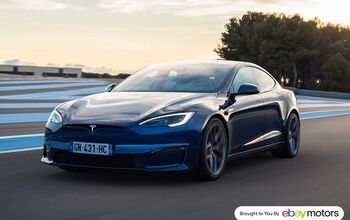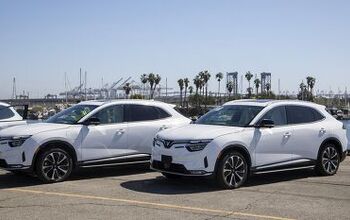This North Korea Thing Has Major Implications for Hyundai

Hyundai Motor Co. is squabbling with its Chinese partner, BAIC Motor, over efforts to reduce supplier costs. The automaker has already faced a myriad of problems with its Korean workforce and witnessed reduced volume in both China and North America this year.
However, its newest problem in the Far East isn’t simply a matter of tweaking its lineup. The issue also has political undertones as the North Korean missile crisis has pitted Beijing and Seoul at odds with each other.
Hyundai Motor said on Tuesday it had suspended production at one of its Chinese factories due to supply disruptions. BAIC Motor had apparently denied payment to suppliers on vaguely political grounds. Hyundai had only recently resumed assembly at four Chinese plants less than a week ago — citing similar issues as the cause for the stall.
According to Reuters, the core issue is Hyundai’s desire to maintain existing supplier relations while BAIC hopes to shift to cheaper Chinese firms in the face of intense competition. The conflict is only bolstered by tensions between the two automakers’ home countries.
South Korea’s implementation of a missile defense system to protect itself from North Korean aggressions has proven to be a hot button issue in China. So hot that, until last year, Hyundai (combined with Kia) was the third largest automaker in China by sales. But Hyundai’s deliveries have dwindled roughly 41 percent between January and July.
“BAIC wants to solve this aggressively and is … asking Hyundai to change its sourcing strategy significantly and immediately,” the head of a Hyundai supplier based in Seoul told Reuters. Hyundai wants to solve this more gradually “over perhaps 5-10 years and do so in phases,” the supplier explained.
Hyundai backs up this claim, stating that it has attempted to source more from Chinese suppliers without abandoning its established network wholesale. But that hasn’t been happening quickly enough for BAIC and may have no bearing on the Chinese public, which has begun turning its back on South Korean products.
“China has started to become a grave for South Korean automakers and suppliers,” said Lee Hang-koo, a senior research fellow at Korea Institute for Industrial Economics and Trade.
BAIC’s motives aren’t purely political. Chinese suppliers are significantly cheaper than their South Korean counterparts — thirty to forty percent cheaper, according to industry experts. “We can’t beat [the local suppliers] in terms of price,” stated a senior executive from a Korean supplier to Hyundai.
However, the Chinese-half of the partnership’s tactics have been downright nasty. BAIC hasn’t paid some suppliers in months and has been aggressively pressuring most to cut their prices all year.
Hyundai’s options on the matter are limited. Chinese automakers have made major strides in recent years and are able to keep costs down by sourcing cheap parts and labor. While its workforce, at least in China, is less likely to press for wage increases, there isn’t much more it can do about its suppliers. Hyundai may have to adhere to BAIC’s wishes if it wants to remain afloat in China, which would have global implications.
The factory in Cangzhou, Hebei province, that was stalled this week is waiting on deliveries of air intake system from a German supplier that halted shipments after nonpayment. Last month, Hyundai suspended production at its four other China plants after a French-based supplier refused to provide fuel tanks when its bills went unpaid.
[Image: Hyundai]

A staunch consumer advocate tracking industry trends and regulation. Before joining TTAC, Matt spent a decade working for marketing and research firms based in NYC. Clients included several of the world’s largest automakers, global tire brands, and aftermarket part suppliers. Dissatisfied with the corporate world and resentful of having to wear suits everyday, he pivoted to writing about cars. Since then, that man has become an ardent supporter of the right-to-repair movement, been interviewed on the auto industry by national radio broadcasts, driven more rental cars than anyone ever should, participated in amateur rallying events, and received the requisite minimum training as sanctioned by the SCCA. Handy with a wrench, Matt grew up surrounded by Detroit auto workers and managed to get a pizza delivery job before he was legally eligible. He later found himself driving box trucks through Manhattan, guaranteeing future sympathy for actual truckers. He continues to conduct research pertaining to the automotive sector as an independent contractor and has since moved back to his native Michigan, closer to where the cars are born. A contrarian, Matt claims to prefer understeer — stating that front and all-wheel drive vehicles cater best to his driving style.
More by Matt Posky
Latest Car Reviews
Read moreLatest Product Reviews
Read moreRecent Comments
- EBFlex Interesting. We are told there is insatiable demand for EVs yet here is another major manufacturer pivoting away from EV manufacturing and going to hybrid. Did these manufacturers finally realize that the government lied to them and that consumers really don’t want EVs?
- Kwik_Shift_Pro4X What's worse than a Malibu?
- MaintenanceCosts The current Malibu is poorly packaged; there's far more room inside a Camry or Accord, even though the exterior footprint is similar. It doesn't have any standout attributes to balance out the poor packaging. I won't miss it. But it is regrettable that none of our US-based carmakers will be selling an ordinary sedan in their home market.
- Jkross22 You can tell these companies are phoning these big sedans in. Tech isn't luxury. Hard to figure out isn't luxury.This looks terrible, there are a lot of screens, there's a lot to get used to and it's not that powerful. BMW gave up on this car along time ago. The nesting doll approach used to work when all of their cars were phenomenal. It doesn't work when there's nothing to aspire to with this brand, which is where they are today. Just had seen an A8 - prior generation before the current. What a sharp looking car. I didn't like how they drove, but they were beautifully designed. The current LS is a dog. The new A8 is ok, but the interior is a disaster, the Mercedes is peak gaudy and arguably Genesis gets closest to what these all should be, although it's no looker either.
- Ajla My only experience with this final version of the Malibu was a lady in her 70s literally crying to me about having one as a loaner while her Equinox got its engine replaced under warranty. The problem was that she could not comfortably get in and out of it.


































Comments
Join the conversation
Hey forget about NORKO - just how much Chinese sourced parts are in Hyundais and Kias? I was thinking about a Hyundai but if the Chinese parts content is over 3% - I won't consider it anymore. It's hard enough to find German sourced parts for Volkswagen. My mechanic and I have to always ask if the parts are German or Chinese sourced. If I am going to pay sky-high prices for German auto parts - may as well be from Germany and yes we check for Chinese made parts packaged as German suppliers.
Read this on Reuters this morning. French fuel tanks in Hyundais made in China got my attention. The other point, missing here, was that there were over 150 South Korean parts suppliers with plants in China serving Hyundai, and they are in a quandary with these constant main assembly plant shutdowns - they'll go broke too if this carries on. The fact that BAIC claims it could get parts cheaper from its local suppliers, and is asking for a 20% haircut from foreign based or foreign owned suppliers in China on EXISTING bills to Hyundai/BAIC, or it won't pay - that is the real problem. And why there are shutdowns. Hyundai disageees and says to get quality from Chinese suppliers will take five to ten years. Stalemate. All those Western companies who hied themselves off to China to get cheap labor to bolster the quarterly report bottom lines twenty years ago are now reaping their rewards on our behalves. Meanwhile, people who cannot read or fail to comprehend that our own capitalists screwed us, would rather blame China Inc and forget what started this mess in the first place. Now off to WallyMart for a new Chinese trashcan; the old one has seen better days.